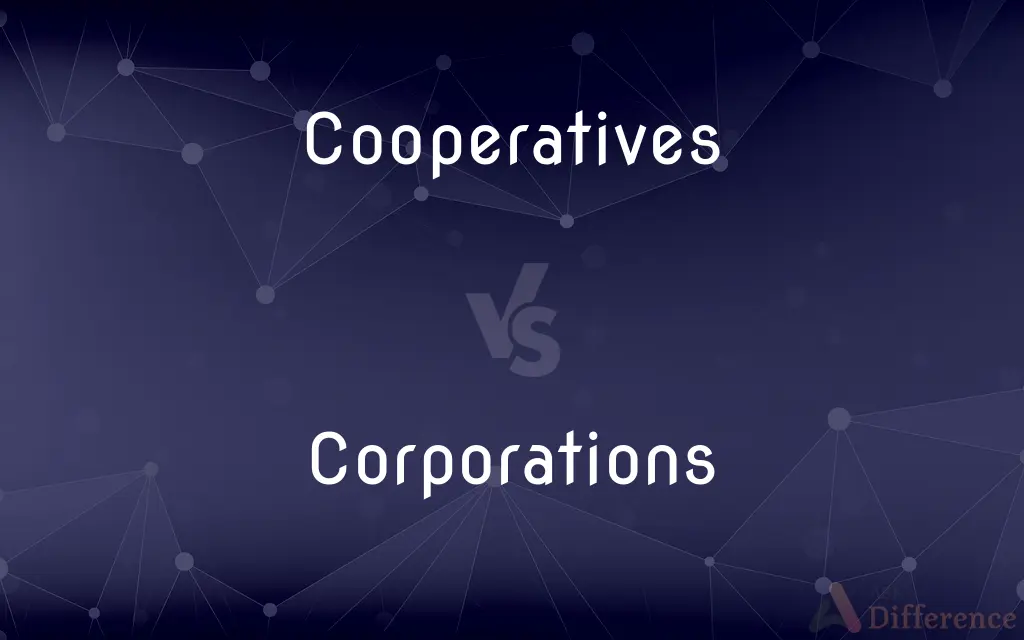Cooperatives vs. Corporations — What's the Difference?
By Tayyaba Rehman — Published on November 18, 2023
Cooperatives are member-owned entities operating for mutual benefit, while Corporations are legal entities owned by shareholders aiming for profit.

Difference Between Cooperatives and Corporations
Table of Contents
ADVERTISEMENT
Key Differences
Cooperatives are organizations formed and operated for the mutual benefit of their members, while Corporations are established legal entities aiming primarily at generating profits for shareholders.
In Cooperatives, each member usually has an equal say in decision-making, often adhering to the principle of one member, one vote. In contrast, in Corporations, shareholders exercise influence based on the number of shares they own.
The primary goal of Cooperatives is to serve the needs and aspirations of their members, which can be consumers, workers, or producers. Corporations, on the other hand, primarily aim to maximize shareholder value.
Profit distribution in Cooperatives typically reflects members' participation or patronage, not just investment. Corporations distribute profits to shareholders in the form of dividends based on the number of shares held.
The values and principles that guide Cooperatives are often centered around community, sustainability, and mutual benefit. Corporations, while they can also champion these values, are typically driven by market demands and shareholder expectations.
ADVERTISEMENT
Comparison Chart
Ownership
Owned by members
Owned by shareholders
Decision-making
Often one member, one vote
Based on share ownership
Primary Objective
Serve member needs and aspirations
Maximize shareholder value
Profit Distribution
Reflects participation or patronage
Based on number of shares held
Guiding Values
Community, sustainability, mutual benefit
Market demands, shareholder expectations
Compare with Definitions
Cooperatives
Work on the principle of mutual benefit.
The profits of Cooperatives are reinvested to provide better services.
Corporations
Can be public (traded on stock exchange) or private.
Many successful Corporations start private, then go public.
Cooperatives
Distribute profits based on patronage, not just investment.
In Cooperatives, the more you engage, the more you benefit.
Corporations
Legal entities distinct from their owners.
Tech giants are among the world's largest Corporations.
Cooperatives
Adhere to values of community and sustainability.
Environmental Cooperatives prioritize sustainable practices.
Corporations
Decision-making influenced by share ownership.
In large Corporations, major shareholders have significant sway.
Cooperatives
Member-owned and operated entities.
Farmers formed Cooperatives to get better prices for their produce.
Corporations
Aim to generate profits for shareholders.
Corporations' primary goal is to maximize shareholder returns.
Cooperatives
Prioritize member needs and aspirations.
Local Cooperatives focus on community well-being and development.
Corporations
Operate under a board of directors and executives.
Corporations' boards ensure strategic alignment and governance.
Cooperatives
Done in cooperation with others
A cooperative effort.
Corporations
An entity such as a business, municipality, or organization, that involves more than one person but that has met the legal requirements to operate as a single person, so that it may enter into contracts and engage in transactions under its own identity.
Cooperatives
Marked by willingness to cooperate; compliant
A cooperative patient.
Corporations
Such a body created for purposes of government. Also called body corporate.
Cooperatives
Of, relating to, or formed as an enterprise or organization jointly owned or managed by those who use its facilities or services
A cooperative department store.
Cooperative apartment buildings.
Corporations
A group of people combined into or acting as one body.
Cooperatives
An enterprise or organization that is owned or managed jointly by those who use its facilities or services.
Corporations
(Informal) A protruding abdominal region; a potbelly.
Cooperatives
A building or complex in which the residents buy shares of stock in a building corporation and are given a lease to a specific apartment.
Corporations
Plural of corporation
Cooperatives
An apartment in such a building or complex.
Cooperatives
Plural of cooperative
Common Curiosities
Can Corporations be socially responsible?
Yes, many Corporations adopt social responsibility initiatives, with some even becoming Benefit Corporations.
Are all businesses either Cooperatives or Corporations?
No, businesses can be sole proprietorships, partnerships, LLCs, etc., besides Cooperatives and Corporations.
How do Corporations raise capital?
Public Corporations can raise capital by issuing shares on stock exchanges, while private ones might seek investors or loans.
Are members of Cooperatives liable for its debts?
Typically, members' liability is limited to their investment, similar to shareholders in Corporations.
Can Corporations be owned by a single individual?
Yes, there are single-shareholder Corporations, especially among smaller businesses.
Do all Corporations pay dividends?
No, Corporations might reinvest profits or use them for other purposes instead of paying dividends.
How are Corporations taxed?
Corporations can be taxed on company earnings, and shareholders might be taxed on dividends, but specifics vary by jurisdiction.
Who gets to decide in Cooperatives?
Decisions in Cooperatives are often made democratically, following a one member, one vote principle.
Do Corporations have a lifespan?
Legally, Corporations can exist indefinitely. However, business dynamics might lead to mergers, acquisitions, or closures.
Do Cooperatives aim for profit?
While Cooperatives aim to be financially sustainable, their primary focus is member benefit rather than profit maximization.
Are Cooperatives always small entities?
No, while many are community-based, some Cooperatives, especially in sectors like finance and agriculture, are large.
Can individuals join multiple Cooperatives?
Yes, individuals can join and participate in multiple Cooperatives, adhering to each's rules and guidelines.
What are the advantages of forming Cooperatives?
Cooperatives empower members, prioritize community, offer mutual benefits, and focus on sustainable practices.
Are all Cooperatives non-profits?
No, while Cooperatives prioritize member benefits, they can operate with a profit model, distributing excess to members.
Can an organization change from a Corporation to a Cooperative?
Such a transition is complex, involving legal, financial, and operational changes, but it's possible.
Share Your Discovery

Previous Comparison
4 Star Hotel vs. 5 Star Hotel
Next Comparison
Crystal Nails vs. Acrylic NailsAuthor Spotlight
Written by
Tayyaba RehmanTayyaba Rehman is a distinguished writer, currently serving as a primary contributor to askdifference.com. As a researcher in semantics and etymology, Tayyaba's passion for the complexity of languages and their distinctions has found a perfect home on the platform. Tayyaba delves into the intricacies of language, distinguishing between commonly confused words and phrases, thereby providing clarity for readers worldwide.
















































